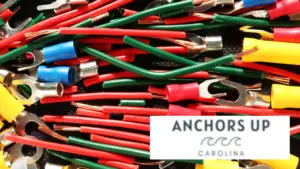One of the biggest headaches boaters face, especially in saltwater environments, is corrosion to wiring. Without question, wires run long distances, typically from the helm to electronic components located throughout the boat. As a former captain, I routinely inspected wiring aboard boats to prevent an issue from arising. Here is what you need to know about boat wiring and the proper inspection routines to prevent corrosion.
Why Does Corrosion Form On Boat Wiring
Considering how wiring is run through boats, some areas are well protected while other areas are highly exposed.
In coastal areas, saltwater is a leading cause of corrosion. However, understand that it is not only saltwater coming in contact with wires but also salt that is in the air.
Unfortunately, battery terminals, wire connections, terminal blocks, and more are prone to corrosion.
The formation of corrosion is caused by humidity and oxygen coming in contact with each other. Corrosion can appear as a green slime or white powder.
Why Is It Important To Inspect For Corrosion
I have come across wire corrosion on a consistent basis as a boater and captain. Without question, I have had marine electronics fail to power up due to corrosion on wires and wire terminals.
With that said, to inspect for wire corrosion, you are going to need to take a close look at all of the boat wiring, in addition to the terminals.
Inspect The Terminal Ends
In most cases, recreational boats are equipped with terminal blocks. Terminal blocks receive power from the battery before distributing it to various electronic equipment on board the vessel.
Unquestionably, terminal blocks are designed to secure a significant amount of wires. The terminal ends are affixed to the bus bar via a screw.
In most cases, the bus bar is mounted inside of a boat console. However, it is not uncommon to have more than one on a vessel.
To inspect the bus bar, take a close look at all of the terminal ends. If you see green slime or white powder, it is imperative to remove the wire, inspect it, and determine if the corrosion has traveled beneath the sheathing.
Importantly, if the corrosion is only on the surface of the terminal, it can be wire-brushed until cleaned and reconnected.
Conversely, if the corrosion has traveled into the wire, the wire will need to be cut to a point where it has not traveled. A new terminal end needs to be installed, and the wire terminal needs to be reconnected to the bus bar.
Check The Butt Connectors
The vast majority of marine electronics receive power through one or more butt connectors. In fact, most electronics have a run of wires running that extend from the inside of the unit to the outside. The wire ends from the battery bank connect to the electronics via butt connectors to provide power.
In most cases, the butt connectors are capable of being heat shrunk to prevent oxygen and humidity from reaching the wire ends.
However, heat shrinking is not a 100 percent solution to preventing corrosion. With that said, if you see green or white powder forming around or under the butt connector, this is a sign of trouble.
Similar to terminal ends, first, the wires must be cut to remove the butt connector. Secondly, the wires should be inspected for corrosion; third, a new heat shrink butt connector must be installed and heated to protect the wires.
How Often Should Boat Wiring Be Inspected
One of the best ways to avoid an electrical issue before heading out on the water is to remain vigilant with inspections.
Unfortunately, boat owners often overlook boat wiring systems and lose vital electronics, including a VHF radio, GPS, or bilge pump.
During my time as a captain, I would inspect the boat’s wiring system on a 6-month basis. At a minimum, the wiring should be inspected at least once per year.
Pushing beyond a year is likely going to cause you to miss an issue that could have been avoided. Remember, you don’t have to do the inspection yourself. Don’t hesitate to hire a boat technician to perform the inspection. Once completed, they will make you aware of any concerns and provide suggestions.
Inspect Your Boat Wiring
The last thing that I want to do is be out on the water with a serious electrical issue. For this reason, it is important to perform wiring inspections on an annual basis at a minimum. Remember to do a thorough lookover of all of the electrical connections and components. In the event you spot an issue, handle the repair before going boating.







